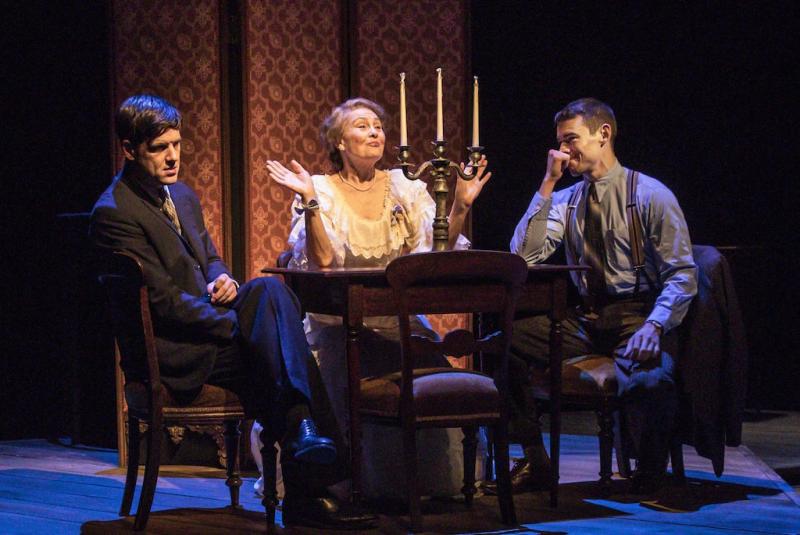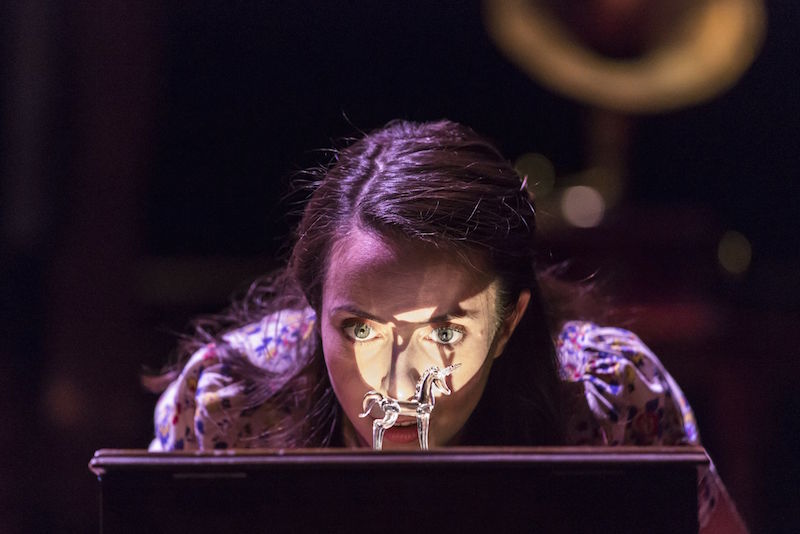The Glass Menagerie, Duke of York's | reviews, news & interviews
The Glass Menagerie, Duke of York's
The Glass Menagerie, Duke of York's
Tennessee Williams' first masterpiece gets the John Tiffany touch

The writing of Tennessee Williams, said his contemporary Arthur Miller, planted “the flag of beauty on the shores of commercial theatre”.
The production is directed by John Tiffany, a creative force behind the West End's Harry Potter and the Cursed Child and, sure enough, inexplicable things happen here, too. Tom Wingfield (Michael Esper) is sitting chatting to us from the family couch when suddenly his sister Laura (Kate O’Flynn) appears in the seat beside him having squirmed through the seams of the upholstery. At mention of their mother, Cherry Jones steps from behind a screen like a magician’s assistant and, more perplexingly, the characters slip into brief shamanic trances. The women flick their wrists over the dining table as if enacting some dark sorcery while Tom, a budding writer, falls backwards from his typewriter, blown by an unseen force.
It’s a little outré, but perfectly of a piece with the expressionism in Williams’s writing. Tiffany’s chief strategy is to clear the play of period clutter. There is that typewriter, a phonograph and a single glass animal, but the family sit down to invisible meals, and the poverty of the Wingfield’s apartment in St Louis is suggested solely by an endless fire escape (design: Bob Crowley) that corkscrews skywards at an alarming angle. It’s a symbol of escape to who-knows-where for the Wingfield siblings, trapped not only by their domineering mother but also by self-pity.
Ageing southern belle Amanda Wingfield is traditionally played as a monster matriarch. She is without doubt overweeningly vain, recounting tales of her “17 gentleman callers” while aware that her plain, polio-damaged daughter is likely to be left on the shelf. But the marvellous Cherry Jones (something of a legend on the US stage) tones down the aggressive notes in Amanda’s register to bring more nuance to the character. Tom may rage against his mother’s interference (she even nags him about the way he chews his food), but as the two of them plot to procure a gentleman caller for Laura, he lays his head fondly on her shoulder. It’s complicated, this mother-and-son thing, as Williams well knew. Jones’s distinctive take on Amanda accentuates the positive: this energetic, still-handsome woman has been dealt blow after painful blow, and she’s not taking it lying down. Snobbish and overbearing she may be, but she’s a lioness in defence of her children. She won’t allow the word “cripple” anywhere near her club-footed daughter, and in the 1930s that was something.
Jones’s distinctive take on Amanda accentuates the positive: this energetic, still-handsome woman has been dealt blow after painful blow, and she’s not taking it lying down. Snobbish and overbearing she may be, but she’s a lioness in defence of her children. She won’t allow the word “cripple” anywhere near her club-footed daughter, and in the 1930s that was something.
Kate O’Flynn (pictured above) is particularly affecting as the damaged girl, matching her graceless gait with a voice that is equally unfortunate. Michael Esper’s Tom struggles to locate the Mississippi accent, but he catches perfectly the disabling outrage of a young man who believes himself to be a talented writer and is shocked on a daily basis to find himself working in a shoe warehouse.
The pressure on the play’s fourth and last character to put things right for the family is profound, but Tiffany resists it. As Laura’s “gentleman caller” Jim, Brian J. Smith gives a performance that is so close to sincere that we are tempted to believe it. We want to think there is good in the world, that people do have it in them to reach out to social oddities such as Laura, and even to fall in love with them. We hear Jim saying all the right things. She has pretty hair and eyes. She has nice hands. And we see poor Laura begin to emerge from the belief that she is worthless. But is Jim sincere? Or has he been reading Psychology: A Beginners Guide? In making Tom’s ambitious friend a putative pioneer of television, the playwright lays a clue.
All power to a director who preserves such subtle observations, and makes such a virtue of ambiguity. Nico Muhly’s incidental music – mysterious and glimmering – endorses the peculiar spell cast by this fine and authoritative production.
- The Glass Menagerie is at the Duke of York's until 29 April
- More theatre reviews on theartsdesk
The future of Arts Journalism
You can stop theartsdesk.com closing!
We urgently need financing to survive. Our fundraising drive has thus far raised £33,000 but we need to reach £100,000 or we will be forced to close. Please contribute here: https://gofund.me/c3f6033d
And if you can forward this information to anyone who might assist, we’d be grateful.

Subscribe to theartsdesk.com
Thank you for continuing to read our work on theartsdesk.com. For unlimited access to every article in its entirety, including our archive of more than 15,000 pieces, we're asking for £5 per month or £40 per year. We feel it's a very good deal, and hope you do too.
To take a subscription now simply click here.
And if you're looking for that extra gift for a friend or family member, why not treat them to a theartsdesk.com gift subscription?
more Theatre
 Dealer's Choice, Donmar Warehouse review - fresh take on a classic about male self-destruction
An ideal revisiting of Patrick Marber's play about risking all to move ahead
Dealer's Choice, Donmar Warehouse review - fresh take on a classic about male self-destruction
An ideal revisiting of Patrick Marber's play about risking all to move ahead
 Much Ado About Nothing, RSC, Stratford - Messina FC scores on the bardic football field
Garish and gossipy, this new production packs a punch between the laughs
Much Ado About Nothing, RSC, Stratford - Messina FC scores on the bardic football field
Garish and gossipy, this new production packs a punch between the laughs
 The Great Gatsby, London Coliseum review - lavish and lively production fails to capture the novel's tortured soul
The production gets stronger in the second half as the shadows of tragedy begin to loom
The Great Gatsby, London Coliseum review - lavish and lively production fails to capture the novel's tortured soul
The production gets stronger in the second half as the shadows of tragedy begin to loom
 The Inseparables, Finborough Theatre review - uneven portrait of a close female friendship
De Beauvoir's novel gets an often charming but undemanding staging
The Inseparables, Finborough Theatre review - uneven portrait of a close female friendship
De Beauvoir's novel gets an often charming but undemanding staging
 Personal Values, Hampstead Theatre review - deep grief that's too brief
New play about two sisters, death and hoarding is well written, but feels incomplete
Personal Values, Hampstead Theatre review - deep grief that's too brief
New play about two sisters, death and hoarding is well written, but feels incomplete
 Ghosts, Lyric Hammersmith Theatre - turns out, they do fuck you up
Ten years on, Gary Owen and Rachel O'Riordan top their triumphant Iphigenia in Splott
Ghosts, Lyric Hammersmith Theatre - turns out, they do fuck you up
Ten years on, Gary Owen and Rachel O'Riordan top their triumphant Iphigenia in Splott
 All the Happy Things, Soho Theatre review - deep feelings, but little drama
New play about a sibling’s death is well imagined and deeply felt, but a bit slender
All the Happy Things, Soho Theatre review - deep feelings, but little drama
New play about a sibling’s death is well imagined and deeply felt, but a bit slender
 Shanghai Dolls, Kiln Theatre review - fascinating slice of history inadequately told
Amy Ng's take on two Chinese titans needs more dramatic ballast
Shanghai Dolls, Kiln Theatre review - fascinating slice of history inadequately told
Amy Ng's take on two Chinese titans needs more dramatic ballast
 Manhunt, Royal Court review - terrifyingly toxic masculinity
After his Olivier Award win for Oedipus, Robert Icke turns to a modern “monster”
Manhunt, Royal Court review - terrifyingly toxic masculinity
After his Olivier Award win for Oedipus, Robert Icke turns to a modern “monster”
 Midnight Cowboy, Southwark Playhouse - new musical cannot escape the movie's long shadow
Two misfits misfire in misconceived show
Midnight Cowboy, Southwark Playhouse - new musical cannot escape the movie's long shadow
Two misfits misfire in misconceived show
 Thanks for Having Me, Riverside Studios review - snappily performed comedy with a lightweight core
Writer-actor Keelan Kember floods the stage with a torrent of gags but few ideas
Thanks for Having Me, Riverside Studios review - snappily performed comedy with a lightweight core
Writer-actor Keelan Kember floods the stage with a torrent of gags but few ideas

Add comment